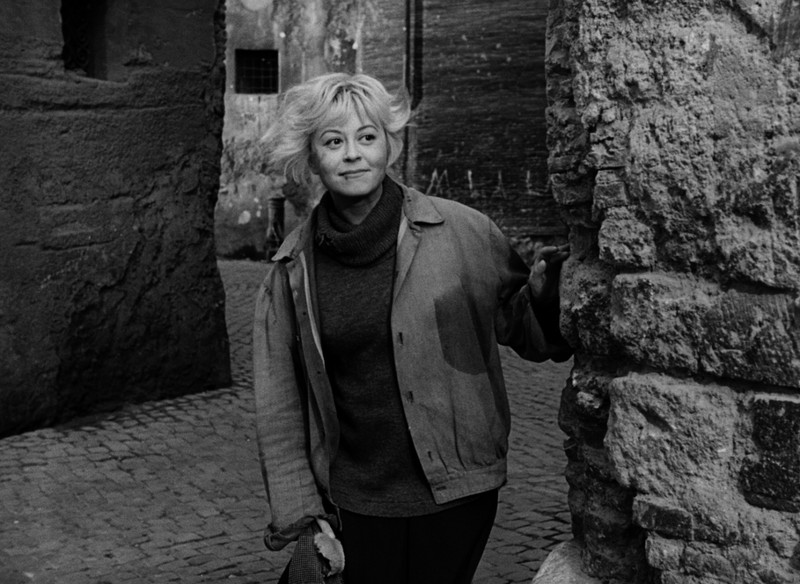Italy, France, 1958
Directed by Eduardo De Filippo
With Giulietta Masina (Nanda Diotallevi, aka Fortunella), Alberto Sordi (Peppino), Franca Marzi (Amelia), Paul Douglas (Golfiero Paganica), Eduardo De Filippo (the head of the theater company), Aldo Silvani (Guidobaldi)

She gingerly steps out of the jail, looks around eagerly, smiles, but then frowns, puts a daunting sulky face, and walks away briskly. In the next scene, she arrives with big, farcical strides in a flea market, throws unkind remarks at a man trying to fill an old tire with air, and starts yelling she is crazy seemingly to attract the crowd, a befuddling and clearly inefficient way to promote her business of selling second-hand objects, scraps, and antiquities she runs with the indolent and plaintive fellow still pumping air and still criticized.
Eager to find hope, love, and just respect available at her feet but thoroughly thwarted by a lover who is unabashedly selfish, lazy, and craven, looking for to shenanigans to scrape more money while exploiting shamelessly his mistress, and always philandering, even as his look would rather keep ladies from paying attention to him, Nanda Diotallevi, also known as Fortunella, is doomed to switch bluntly and repeatedly from smile to sullenness, from excitement to disappointment, from bliss to anger. The narrative is her long journey to get a better deal in life, relying on her luck and grit, which means first to try to tame her romantic and business partner Peppino and then to get rid of him – the first effort would fail, if only because she cannot yet imagine a life without him, the second would be more successful but land her into a world completely different from the Roman streets where she has been struggling to make ends meet, enabling her to have the dream life she has been dreaming about all along in fact, though on quite different terms.
Most of the events occur by night: it is usually away from the crowd and the daylight highlighting the most sordid and frustrating aspects of the life at the bottom of a fast-changing and increasingly wealthier society that Fortunella would find the opportunity to settle score with Peppino but also to make decisive encounters that would eventually change her life. In the eerie atmosphere of Roman nights, it is possible to meet an amazing and eccentric professore, a real weirdo and a flamboyant character, ready to like you, to believe in you, and to bring you into a new, if illusory, world, and it is easier to play the kind of dirty tricks that your partner always intends to play on you. Fortunella would thus try to get rid, in fact to do away, with the cousin Peppino has set up in their home, Amelia, who is clearly more appreciated as a possible mistress than as a distant relative, or spoil a dealing Peppino negotiated with dubious characters.
Above all, Fortunella would strike up a hectic but warm relationship with Golfiero Paganica, who eventually lets her step in his dilapidated family house, enabling her, by chance to meet and to get hired in a theater company which is far less talented and successful than its head’s allure suggests. Her first performance on stage, one evening, is undercut by the flaws of the company and the perennial drunkenness of Golfiero Paganica; but when police arrest Peppino later, the stage would stand ready to welcome her.
She would at long last play the part of a princess – Fortunella’s quirkiest aspect is that her belief she is the illegitimate daughter of a prince, Guidobaldi, who lives near the flea market where she works. A belated meeting between the two, after the death of Golfiero Paganica who happened to be a friend of both, would dispel the illusion – but this is the kind of illusion that helps someone get over the rough deal life can hand.
Actress Giuletta Masina plays a character whose sheer energy, mercurial temperament, her yearning for love, her stubborn effort to be hopeful, and her suffering at the hands of mediocre men (in fact just one here, but on a grand scale), can vaguely bring to mind the prostitute she played a year earlier in Federico Fellini’s “Le notti di Cabiria” – as it happens, the 1957 feature’s director is one of the screenwriters of the 1958 one. But “Fortunella” is one of the many productions that have made Eduardo De Filippo such a household name in the 1950s Italian cinema, a specialist of light-hearted, pure entertainment flicks owing something to the Naepolitan tradition of theater he comes from. In this film, it is rather Fellini who provides inspiration, pictures looking sometimes as a cheap Fellini imitation, the case of a complex, personal and magical, vision getting cheerfully and conveniently recycled to fit a more ribald and farcical pattern.
This slight comedy relies heavily on the much-praised skills and much-loved, easily relatable, personae of Masina and great actor Alberto Sordi. The chemistry between then works, the incidents involving the unfortunate Fortunella (this character’s name is a facile oxymoron to most of her destiny) are funny enough (thanks to Masina’s stunning blend between mischievousness, naughtiness, buoyancy, and naïveté, displayed by her wonderful wide-opened eyes, expressive cheeks, tender lips and a range of gestures swaying between the childish and the shrewish), and the whose business is more or less enjoyable, but without much personality, originality, or poignancy (the film is also a curiosity because of a score composed by the great Nino Rota – another obvious link to the Fellini world – which feature chords that would be used for the music he would compose for the 1972 Francis Coppola masterwork “The Godfather”).

